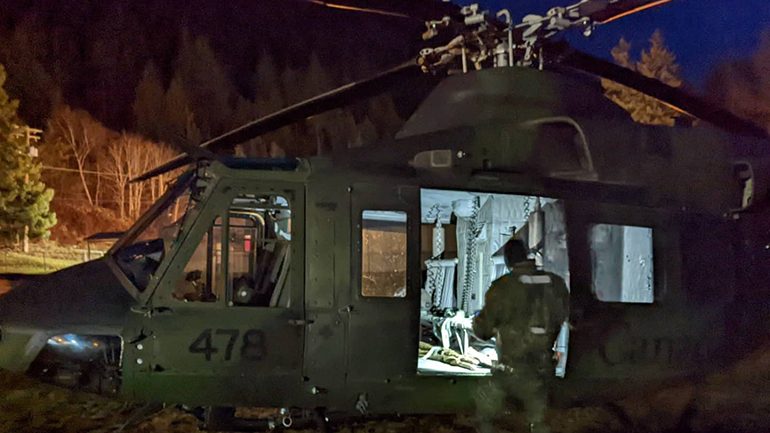
A family and their two-year-old living in a remote community receive timely care during flood conditions.
On November 23 -- just a week and a day after Dr. Aseem Grover, site medical director for Fraser Canyon Hospital, and others travelled through storms and landslides on railways to provide intensive care to a critically injured teen, Dr. Grover responded to duty again. This time to travel in a Canadian Armed Forces military helicopter to provide urgent medication for two patients, including a two-year-old, both living in the remote community of Boston Bar.
Dr. Grover and the military crew left the Abbotsford Wildfire Tanker Base late that afternoon. They set down in a field near Boston Bar Elementary School where the community’s Band Chief Pam Roberts met Dr. Grover in her car and drove him through the rural and reserve areas to his patients. They arrived back at the helicopter within 30 minutes for a return flight home in the fog that night.
“At one point we flew right near the power lines, which were challenging to locate at times due to the fog,” says Dr. Grover. “This required the team to perform some brief tactical maneuvers dropping down several feet with a quick left turn. Before I could register what was happening, we were hovering 15 feet from the ground.”
The helicopter touched down to assess their situation on a small rocky beach next to the Fraser River. After concluding they were at flood risk, they had to move quickly. A CP Rail truck saw the helicopter and lit up the skies, trees and power lines with flood lights helping them to clear hazards and land safety on the opposite riverbank. Dr. Grover’s colleague would pick him up here to return home.
Dr. Grover, who is the site medical director at Fraser Canyon Hospital and also a primary care physician for Hope and Fraser Canyon areas, attributes the success of the trip to the relationships he and his colleagues have built with Boston Bar and other remote communities.
“Our relationships with the community members allowed us to complete the tasks that needed to be done in an efficient manner while navigating a geographically challenging area,” he says. “Our response to these disasters will further strengthen our relationships.”
“It was exciting to be working alongside the military and get our patients what they needed,” says Dr. Grover. “It was a wild experience for me, but I’m sure relatively routine for the military personnel and I’m thankful they had the capabilities and training they did. I would certainly do it again if it was required to help patients in remote communities.”
